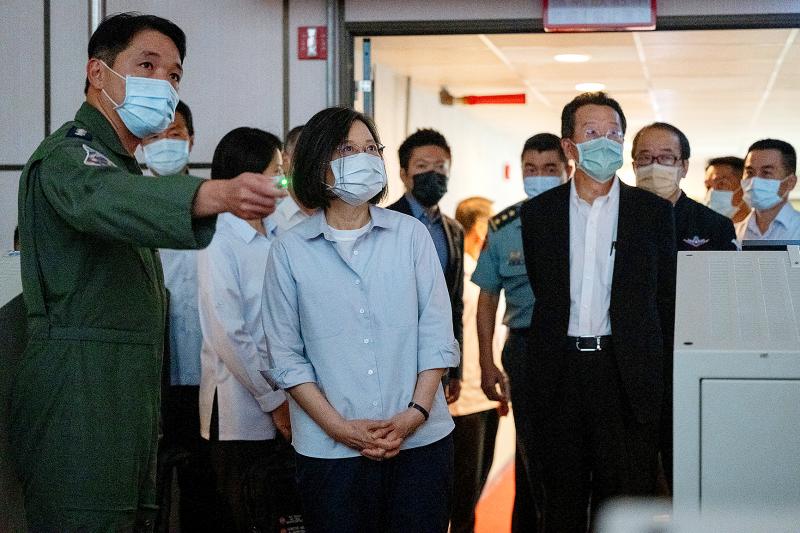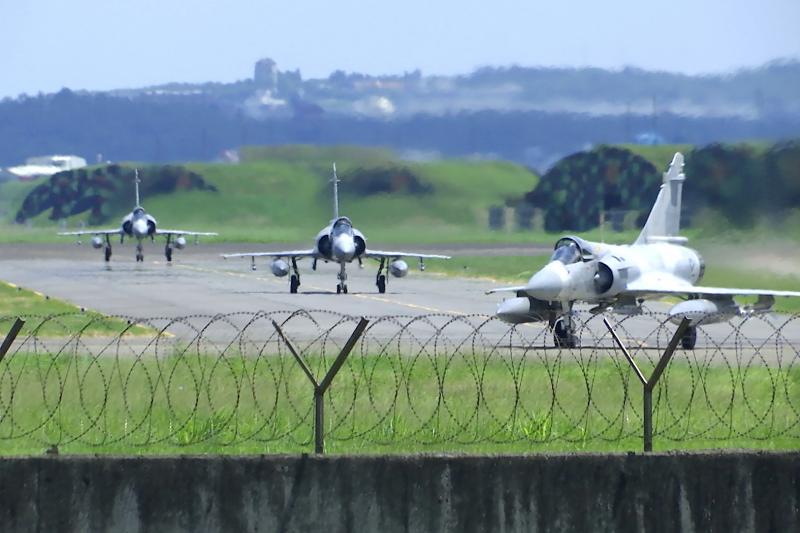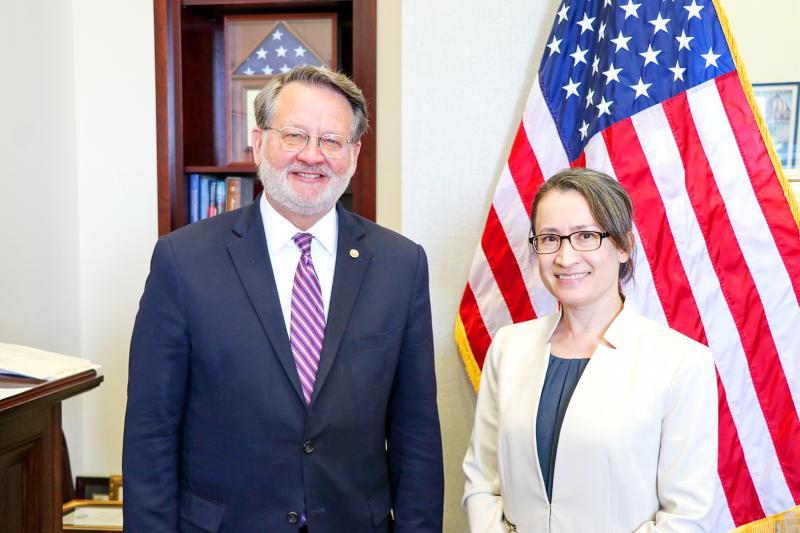President Tsai Ing-wen (蔡英文) yesterday said that China’s threat of force is undiminished, even though Beijing’s largest- ever military drills around the nation seemed to be scaling down.
Furious about a visit to Taipei by US House of Representatives Speaker Nancy Pelosi, China launched ballistic missiles and deployed multiple aircraft and warships in the past few days to simulate sea and air attacks.
China on Wednesday said it would keep up patrols, but had “completed various tasks” around Taiwan, signaling a possible end to the war games even while keeping up pressure.

Photo: Taiwan Presidential Office
Taiwan has also been conducting relatively small-scale, annual exercises, scheduled before the flare-up and aimed at preparing to repel an invasion.
“At present, the threat of Chinese military force has not decreased,” Tsai told air force officers, according to a statement released by the Presidential Office.
Taiwan will not escalate conflict nor provoke disputes, she was quoted as saying, while adding: “We will firmly defend our sovereignty and national security, and adhere to the line of defense of democracy and freedom.”

Photo:AP
“In the face of China’s recent military provocations, the nation’s armed forces are right on the front lines, and its duties will only be more onerous and the pressure will be even greater,” Tsai added.
Meanwhile, the Ministry of Foreign Affairs slammed Beijing’s release on Wednesday of a white paper in which it reaffirmed that it would not rule out using force to annex Taiwan.
“We are ready to create vast space for peaceful reunification, but we will leave no room for separatist activities in any form,” said the paper, the first it has issued on Taiwan since 2000.

Photo: Screen grab from the Twitter account of US Senator Gary Peters
Ministry spokeswoman Joanna Ou (歐江安) told a news conference in Taipei that Taiwan has been subjected to incessant provocations from China, including military threats, cyberattacks and the dissemination of misinformation.
The white paper by China’s Taiwan Affairs Office contradicts the reality that Taiwan and China are not subordinate to each other, while betraying Beijing’s intention to break international law by violating the other’s sovereignty, she said.
“Taiwan strongly condemns and protests [the white paper] as a crude piece of political machination,” she said.
“Taiwan’s sovereignty rests with its 23.5 million citizens, who are the sole arbiters of the country’s future,” she said. “This government will never accept any cross-strait framework that was dictated by authoritarian China.”
The surge of militarism and reckless behavior emanating from Beijing is ample proof that China is the true troublemaker and the root cause of instability in the region, she said.
“Taiwan solemnly demands that the Beijing regime cease its threats and lies at once, and that it would do well not to underestimate the Taiwanese will and ability to defend their homeland,” she said.
Meanwhile, Representative to the US Hsiao Bi-khim (蕭美琴) said in an interview on Wednesday that Taiwan would not be cowed by intimidation or surrender its hard-earned democracy to Beijing.
“The people of Taiwan are trying to carry on with our lives,” she told MSNBC News. “We have been seeing such threats from China for decades; this is not new to us.”
“Although the intensity of the recent exercises was truly alarming, we are not letting that affect the way we live our lives and our desire to breathe the air of freedom,” she said.
Beijing’s current strategy is to use “intimidation and coercion” to force Taiwan to accept its terms, which is the “one country, two systems” formula being utilized by the regime in its governance of Hong Kong, she said.
“Unfortunately, we have seen a tragic backslide of basic rights in Hong Kong, the deprivation of the freedom of speech, the freedom of association and the freedom of [the] press,” she said. “That is not what the people of Taiwan want.”
Hsiao called on Taiwan’s friends to stand with the country in opposing the China’s use of military, which harms not only peace in the Taiwan Strait, but around the world.
She also thanked US lawmakers for their bipartisan support of the Taiwan Policy Act.
The proposed legislation would provide Taiwan with effective instruments with which to defend itself and the world from wars of aggression, she said.

NATIONAL SECURITY THREAT: An official said that Guan Guan’s comments had gone beyond the threshold of free speech, as she advocated for the destruction of the ROC China-born media influencer Guan Guan’s (關關) residency permit has been revoked for repeatedly posting pro-China content that threatens national security, the National Immigration Agency said yesterday. Guan Guan has said many controversial things in her videos posted to Douyin (抖音), including “the red flag will soon be painted all over Taiwan” and “Taiwan is an inseparable part of China,” while expressing hope for expedited “reunification.” The agency received multiple reports alleging that Guan Guan had advocated for armed reunification last year. After investigating, the agency last month issued a notice requiring her to appear and account for her actions. Guan Guan appeared as required,

DAREDEVIL: Honnold said it had always been a dream of his to climb Taipei 101, while a Netflix producer said the skyscraper was ‘a real icon of this country’ US climber Alex Honnold yesterday took on Taiwan’s tallest building, becoming the first person to scale Taipei 101 without a rope, harness or safety net. Hundreds of spectators gathered at the base of the 101-story skyscraper to watch Honnold, 40, embark on his daredevil feat, which was also broadcast live on Netflix. Dressed in a red T-shirt and yellow custom-made climbing shoes, Honnold swiftly moved up the southeast face of the glass and steel building. At one point, he stepped onto a platform midway up to wave down at fans and onlookers who were taking photos. People watching from inside

A Vietnamese migrant worker yesterday won NT$12 million (US$379,627) on a Lunar New Year scratch card in Kaohsiung as part of Taiwan Lottery Co’s (台灣彩券) “NT$12 Million Grand Fortune” (1200萬大吉利) game. The man was the first top-prize winner of the new game launched on Jan. 6 to mark the Lunar New Year. Three Vietnamese migrant workers visited a Taiwan Lottery shop on Xinyue Street in Kaohsiung’s Gangshan District (崗山), a store representative said. The player bought multiple tickets and, after winning nothing, held the final lottery ticket in one hand and rubbed the store’s statue of the Maitreya Buddha’s belly with the other,

‘NATO-PLUS’: ‘Our strategic partners in the Indo-Pacific are facing increasing aggression by the Chinese Communist Party,’ US Representative Rob Wittman said The US House of Representatives on Monday released its version of the Consolidated Appropriations Act, which includes US$1.15 billion to support security cooperation with Taiwan. The omnibus act, covering US$1.2 trillion of spending, allocates US$1 billion for the Taiwan Security Cooperation Initiative, as well as US$150 million for the replacement of defense articles and reimbursement of defense services provided to Taiwan. The fund allocations were based on the US National Defense Authorization Act for fiscal 2026 that was passed by the US Congress last month and authorized up to US$1 billion to the US Defense Security Cooperation Agency in support of the